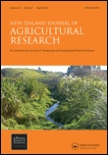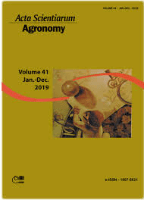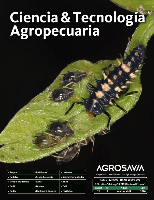
Revista Caatinga
Scope & Guideline
Advancing Science, Enriching Communities
Introduction
Aims and Scopes
- Sustainable Agricultural Practices:
The journal emphasizes innovative methods and technologies that promote sustainable agriculture, particularly in semi-arid regions. This includes studies on crop rotation, organic fertilizers, and the use of biostimulants. - Crop Physiology and Management:
Research into the physiological responses of various crops under different environmental conditions, such as drought or salinity, is a core focus. This encompasses studies on nutrient uptake, growth patterns, and stress tolerance. - Soil Health and Fertility:
The journal publishes articles on soil management strategies, including the use of organic amendments, biochar, and cover crops to enhance soil health and fertility. - Pest and Disease Management:
A significant area of research involves integrated pest management and the impact of biocontrol agents. Studies often assess the efficacy of natural products and biological control methods. - Plant Breeding and Genetic Diversity:
Research on the genetic improvement of crops, including resistance to pests and diseases, is prominently featured. This includes studies on genetic diversity among local varieties and the development of new cultivars. - Environmental Impact of Agricultural Practices:
The journal investigates the ecological consequences of farming practices, including water use efficiency, soil erosion, and biodiversity conservation in agricultural landscapes.
Trending and Emerging
- Climate Resilience in Agriculture:
Research focusing on the adaptation of crops to changing climatic conditions, including drought tolerance and salinity resistance, has gained traction. This is critical for ensuring food security in semi-arid regions. - Use of Biostimulants and Organic Amendments:
There is an increasing interest in the application of biostimulants and organic amendments, such as biochar and green manure, to enhance crop productivity and soil health. - Agroecological Practices:
Emerging studies are focusing on agroecological principles, integrating ecological practices into agricultural systems to promote sustainability and biodiversity. - Precision Agriculture Technologies:
The integration of precision agriculture techniques, including remote sensing and data analytics, is becoming a prominent theme, aiming to optimize resource use and improve crop management. - Water Management Strategies:
Research on innovative irrigation techniques and water conservation practices is trending, particularly as water scarcity becomes a pressing issue in semi-arid regions. - Genetic Improvement for Resilience:
There is a growing emphasis on genetic research aimed at developing crop varieties that are resilient to biotic and abiotic stresses, reflecting the need for sustainable agricultural practices.
Declining or Waning
- Traditional Crop Cultivation Methods:
There has been a noticeable decrease in studies focusing solely on traditional farming practices without incorporating modern innovations or sustainability assessments. This shift reflects a broader trend towards integrating modern agricultural techniques. - Chemical Fertilizer Dependency:
Research specifically centered on the effectiveness of chemical fertilizers without consideration of organic alternatives or sustainable practices has become less prevalent, indicating a move towards more holistic approaches in agriculture. - Single Crop Studies:
There is a waning interest in studies that examine single crop systems in isolation. Instead, the trend is shifting towards intercropping and mixed cropping systems that enhance biodiversity and resilience. - Conventional Pest Control Methods:
There is a decline in research that supports conventional chemical pest control methods without exploring integrated pest management strategies or sustainable alternatives. - Soil Erosion Studies:
While still relevant, there has been a relative decrease in the frequency of studies exclusively focused on soil erosion, as more comprehensive approaches to soil health and fertility management are being prioritized.
Similar Journals

BANGLADESH JOURNAL OF BOTANY
Connecting Ecology and Conservation in BotanyBANGLADESH JOURNAL OF BOTANY is a prominent publication in the field of plant sciences, dedicated to advancing research and knowledge within the botanical community. Published by the BANGLADESH BOTANICAL SOC, this journal serves as a vital platform for researchers and scholars seeking to disseminate their findings related to plant biology, ecology, and conservation practices, particularly within the unique context of Bangladesh's diverse flora. With an ISSN of 0253-5416 and an E-ISSN of 2079-9926, the journal encompasses a wide scope of topics, reflecting interdisciplinary approaches in botanical research. Since its inception, with convergence periods from 1996 to 2001 and from 2003 to 2024, it has garnered recognition, positioned in the Q4 category in the Plant Science field with a ranking of #459/516 in Scopus, indicating its contribution to the field despite its developing impact. Operating within Bangladesh, at the UNIV DACCA DEPT BOTANY, the journal provides a crucial insight into the ecological and agricultural implications of plant studies in the region, catering to the needs of academics, professionals, and students eager to engage with contemporary botanical research.

Romanian Agricultural Research
Exploring Agronomy to Enhance Global PracticesRomanian Agricultural Research is a prominent academic journal dedicated to advancing the field of agricultural science with a specific focus on agronomy and crop management. Published by the NATL AGRICULTURAL RESEARCH & DEVELOPMENT INST in Romania, this journal has established itself as an important resource within its discipline, evidenced by its Q3 ranking in the Agronomy and Crop Science category for 2023. With its ongoing publication since 2008, the journal provides a platform for researchers and professionals to disseminate their findings and share innovative practices that address the challenges faced in agricultural development. Although it operates under a non-open access model, Romanian Agricultural Research commits to rigorous peer-review processes, ensuring the high-quality content that enhances the academic community’s knowledge base. The journal's objective is to foster dialogues surrounding sustainable agriculture, improve crop yield, and contribute to the enhancement of agricultural practices globally. Researchers, professionals, and students will find this journal to be an invaluable repository of knowledge and a catalyst for future agricultural innovations.

Agronomy-Basel
Nurturing the Future of Agronomy with Cutting-Edge ResearchAgronomy-Basel is a leading international journal dedicated to advancing the field of agronomy and crop science, published by the respected MDPI. Since its inception in 2011, this open-access journal has provided a vital platform for the dissemination of high-quality research, featuring innovative studies and reviews that contribute to the understanding of agricultural practices and crop management. With an impressive impact factor and ranked in the Q1 quartile of its category for 2023, Agronomy-Basel has established itself as a premier resource in the realm of Agricultural and Biological Sciences, achieving a commendable rank of #62 out of 406 in its field, placing it in the 84th percentile. The journal targets researchers, professionals, and students who are dedicated to enhancing agricultural sustainability and productivity. Located in Basel, Switzerland, the journal's commitment to open access empowers global accessibility to flourishing agricultural advancements, thus fostering collaboration and innovation across the globe.

Agrosystems Geosciences & Environment
Fostering interdisciplinary research for a healthier planet.Agrosystems Geosciences & Environment, published by WILEY, is a premier open access journal dedicated to advancing the interdisciplinary field of agricultural and environmental sciences. With an E-ISSN of 2639-6696, the journal has gained recognition since its inception in 2018, currently holding a Q2 ranking in Agricultural and Biological Sciences, Plant Science, and Soil Science. Operating from the United Kingdom, Agrosystems Geosciences & Environment contributes significantly to knowledge generation and dissemination, offering vital insights into sustainable practices, soil management, and crop optimization. Researchers and professionals will find the open access model particularly advantageous, promoting greater visibility and engagement within the scientific community. By bridging the gap between geosciences and agrosystem management, this journal is vital for those committed to addressing today's critical environmental challenges.

NEW ZEALAND JOURNAL OF AGRICULTURAL RESEARCH
Shaping the Future of Agriculture with Rigorous ScienceNEW ZEALAND JOURNAL OF AGRICULTURAL RESEARCH is a prestigious, peer-reviewed journal published by Taylor & Francis Ltd that has been at the forefront of agricultural science since its inception in 1958. With a strong focus on the fields of Agronomy and Crop Science, Animal Science and Zoology, Plant Science, and Soil Science, this journal has established itself in the academic community, achieving a notable Q2 ranking in various agricultural categories as of 2023. The journal thrives on its commitment to disseminating cutting-edge research and innovative practices that address contemporary challenges in agriculture. Although it does not currently offer an open access option, its valuable contributions can be accessed through various academic platforms, ensuring that vital research reaches a wide audience of researchers, professionals, and students globally. The journal's continued relevance and authority are reflected in its strong Scopus rankings, further emphasizing its role as a critical journal within the agricultural sciences.

ACTA SCIENTIARUM-AGRONOMY
Connecting researchers to the pulse of agricultural innovation.ACTA SCIENTIARUM-AGRONOMY is a prestigious, peer-reviewed journal published by UNIV ESTADUAL MARINGA, PRO-REITORIA PESQUISA POS-GRADUACAO, focusing on advanced research in the field of agronomy and crop science. Since its inception as an Open Access journal in 2007, it has significantly contributed to disseminating high-quality research, allowing unrestricted access to its content for a global audience. Operating from Brazil, the journal holds a notable Q2 category ranking in Agronomy and Crop Science as of 2023, validating its importance within the academic community. The journal’s Scopus ranking positions it in the 49th percentile among Agricultural and Biological Sciences, indicating a robust foundation for impactful research. With a commitment to innovation and scientific excellence, ACTA SCIENTIARUM-AGRONOMY aims to provide researchers, professionals, and students with vital insights that drive forward our understanding of agriculture and its environmental implications.

Revista Corpoica-Ciencia y Tecnologia Agropecuaria
Transforming Agricultural Practices through Cutting-Edge Research.Revista Corpoica-Ciencia y Tecnologia Agropecuaria is a premier open access journal dedicated to the dissemination of innovative research in the field of agricultural and biological sciences. Published by CORP COLOMBIANA INVESTIGACION AGROPECUARIA-CORPOICA, this journal has been a key resource for professionals and academics since its inception in 1996, providing valuable insights into the challenges and advancements in agro-technology. As a recognized journal with a Q3 ranking in its category for 2023, it operates with a mission to enhance knowledge transfer and foster collaboration among researchers in Colombia and beyond. The journal is indexed in Scopus, which highlights its commitment to maintaining rigorous academic standards and broadening the scope of agricultural research. With an emphasis on advancing sustainable agricultural practices and technological innovations, Revista Corpoica serves as an essential platform for sharing groundbreaking studies, reviews, and original research that contribute to the growing body of agricultural knowledge. Researchers, professionals, and students alike will find this journal an invaluable tool to stay informed and engaged with the latest advancements in agricultural science.

Journal of Agricultural Sciences-Tarim Bilimleri Dergisi
Nurturing Ideas, Growing Solutions in AgricultureJournal of Agricultural Sciences - Tarim Bilimleri Dergisi, published by Ankara University, Faculty of Agriculture, is a prominent open-access journal that has been fostering academic dialogue in the field of agricultural studies since 2010. With ISSN 1300-7580 and E-ISSN 2148-9297, this journal contributes significantly to the scientific community, particularly within the realms of agronomy, crop science, animal science, and plant science. As of 2023, it holds a Q3 classification in Agronomy and Crop Science, and Q4 in both Animal Science and Zoology and Plant Science, indicating its growing influence and dedication to advancing research in these areas. Situated in Turkey, this journal serves as a vital platform for scholars, professionals, and students, inviting submissions that enhance our understanding of agricultural innovation and sustainability. With a commitment to disseminating high-quality research, Journal of Agricultural Sciences ranks favorably within Scopus, providing an invaluable resource for exploring evolving agricultural paradigms.

Revista de Ciencias Agricolas
Connecting Research with Rural DevelopmentRevista de Ciencias Agricolas, published by UNIV NARINO, is a prominent open-access journal dedicated to advancing the field of agricultural sciences. Since its inception in 1969, this journal has been an invaluable resource for researchers, professionals, and students alike, focusing on a wide array of topics that include sustainable farming practices, agricultural technology, and rural development. With the ISSN 0120-0135 and the E-ISSN 2256-2273, the Revista de Ciencias Agricolas ensures broad accessibility to its research articles, facilitating a wider dissemination of knowledge within the agricultural community. Situated in San Juan Pasto, Nariño, Colombia, the journal is committed to providing high-quality content that addresses both local and global agricultural challenges, thereby contributing to the enhancement of food security and livelihoods across diverse populations. The journal's inclusive approach not only fosters academic discourse but also encourages innovative solutions within the agricultural sector, making it an essential platform for knowledge exchange in this vital area of study.

Revista de Agricultura Neotropical
Connecting Researchers to the Heart of AgricultureRevista de Agricultura Neotropical, published by UNIV ESTADUAL MATO GROSSO SUL, serves as a pivotal platform for disseminating research in the fields of agronomy and crop science. Since its inception as an open-access journal in 2014, it has been dedicated to promoting innovative research and practical applications within the agricultural sector, specifically tailored to the challenges and dynamics of the tropical agriculture landscape in Brazil and beyond. Although currently positioned in the Q4 quartile of Scopus rankings, and with a modest agricultural science percentile, the journal actively encourages contributions that highlight sustainable agricultural practices, tropical crop management, and emerging technologies in farming. With its commitment to open access, the Revista de Agricultura Neotropical broadens the reach of critical knowledge, making it accessible to researchers, professionals, and students alike, thus fostering a collaborative environment for advancing agri-scientific initiatives.